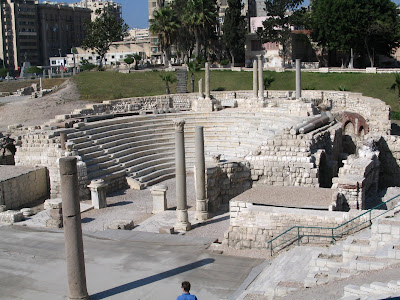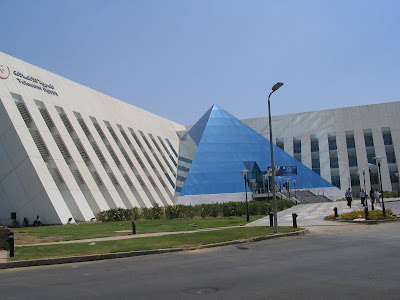


 After the Pyramids we saw the Khufu Boat, one of 2 boats discovered next to the pyramid that was painstakingly restored over 10 years and was kept in a small museum built next to the pyramids to maintain and display it. The boat is gigantic, over 140 feet long, and was assumed to be for the king's journey to the afterlife with his servants. It was buried in a giant tomb covered with over 40 limestone slabs weighing 20 tons each. Here's my best picture of the boat...
After the Pyramids we saw the Khufu Boat, one of 2 boats discovered next to the pyramid that was painstakingly restored over 10 years and was kept in a small museum built next to the pyramids to maintain and display it. The boat is gigantic, over 140 feet long, and was assumed to be for the king's journey to the afterlife with his servants. It was buried in a giant tomb covered with over 40 limestone slabs weighing 20 tons each. Here's my best picture of the boat...
And what better way to follow up an exhausting day of climbing pyramids and riding camels than a nice, relaxing stop at the Kalid Ali Baba Bazaar. And yes, that is sarcastic, since the moment we stepped into the place we were accosted by 500 salesmen. Now, I appreciate that everyone has to make a living, and when you have 300+ shops all selling pretty much the same 10 items, there's going to be a fight for customers. But there's aggressive and then there's insanely aggressive, and you had to be a bargainer of the highest order to feel comfortable haggling in that environment. I took a shot at a few items but couldn't quite pull the trigger on anything. My travel companions bought plenty, with various levels of success in the rip-off department...
After a quick rest we headed out for a traditional dinner cruise on the Nile, a fitting end to the trip complete with singing, a whirling dervish, and belly dancing. The dervish was insane, the performer spun around for the entire 15 minute (or longer) performance without ever stopping, using a number of costume elements to create patterns while spinning. When he first came out I could tell our group didn't know what to expect, but everyone was impressed. The belly dancer was a different story - while obviously talented in her own way, we couldn't help but find the busty, scantily clad dancer at odds with the extremely conservative culture of Egypt in general. The performance was risque enough to send our professor to the back corner of the table to avoid being photographed. Sadly I didn't have my camera with me for the dinner, but just about everyone else did, so there will be plenty of photos of the event in my photo album. Link to come after our final class...
So that wrapped up our trip. All told, an amazing experience, and a great balance of business-related events and sight-seeing. We owe a huge thanks to our hosts and our Professor for setting up all of the events and having such a great knowledge of the area, and for putting up with us for over a week. Jessica, Andrew and I actually did not head home with the others at this point - we took off for a couple of days of sun and relaxation at Sharm al Sheikh. I'll post some pictures of that as well in the final photo gallery, but needless to say it was an unbelievably beautiful and luxurious way to end our trip.
Ok, I'll post a picture of the view from our Villa in Sharm to end on... Thanks for reading!


























